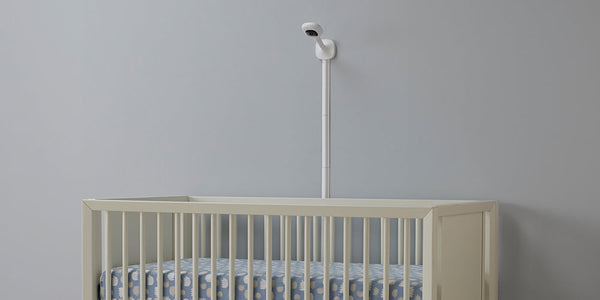Newborns typically sleep an average of 16 to 20 hours a day, leaving many parents wondering “is my baby sleeping too much?” or "why does my newborn sleep so much?"
Because the new parent mind can quickly fall down the rabbit hole of paranoia, this question can quickly lead to a catalog of more nerve-wracking questions and concerns.
Why Is My Newborn Sleeping So Much?
So, first and foremost, it’s crucial for new parents to understand that a baby who seems to have little interest in anything but catching zzzs is not just normal, but doing exactly what their body needs to healthily develop – as long as they’re still getting in eight to twelve feedings over every 24-hour period.
Although newborns sleep a lot, they generally sleep in short intervals because their stomachs are so small. Newborns wake up, on average, every three hours to eat – this number varies between breastfed and formula-fed babies, with some formula-fed babies being able to go slightly longer stretches between feedings. If your pediatrician reports that baby is gaining adequate amounts of weight, let the sleepy times roll.
(With all that said, if you still feel worried about your baby’s abundant sleep, check in with your pediatrician to quell your concerns.)
But, the question of “why” still remains. Why do newborns need to sleep like their steady supply of milk and fresh diapers nappies depends on it?
Here’s the breakdown of why your newborn is a sleeping overachiever.
Patterns Developed in the Womb
A newborn doesn’t just suddenly become a snooze-aholic after birth – by 32 weeks gestation, a fetus uses 90-95% of their free-time snoozing – who wouldn’t frequent dreamland if they were floating in a climate-controlled sack that provides ideal amounts of nourishment and oxygen, and is filled with the sounds of a loving mother’s heartbeat, digestive system, and voice. It’s even been found that around months seven and eight of gestation a fetus’s heart rate slows a bit when they hear their mother’s voice.
And it’s not just the amount of sleep, but the type of sleep as well, that stays fairly consistent from late stages of gestation to early stages of a newborn’s life. This sleep cycle begins around the seventh month of gestation when a fetus’s brain goes back and forth between REM (a period of activity for the brain) and non-REM (a period of rest for the brain) sleep every 20 to 40 minutes.
When a fetus is nearing their birthday, they sleep around 85-90% of the time – a stat that holds steady into their life as a newborn. Some experts even believe that fetuses dream, just like they do after checking out of the womb.
And while a newborn’s environment out of the womb is vastly different from their in-utero suite, they’re likely still finding themselves in many situations that are conducive for slumber.
Abundance of Sleepiness-Inducing Activities
While older babies are often offered more opportunities to engage in stimulating play, a newborn’s environment typically lends itself to frequent sleep. Think about it – what are the two primary activities new parents are trying to convince their newborn to do? Eat and sleep, and eat and sleep ( with regular diaper changes thrown into the mix!)
Because of this eat and sleep cycle, most newborns are frequently being held and offered a breast or bottle, while in a soothing environment. After the feeding, many newborns are still being held, with their adult patting their back (in hopes of a burp) while bouncing up and down or swaying side to side.
In addition, many new moms need ample time to recover from childbirth and are typically hibernating in a dark, cool, and calm environment, with their newborn by their side, or more often, on their chest. The vibe of this serene environment also impacts baby, causing them to find sleep when there is little to distract them from this pursuit.
On the rare occasions baby isn’t being held and fed or hanging in the aforementioned soothing environment, they’re likely in a moving vessel (e.g., a stroller, car seat, or swing) that also exudes primo sleepy vibes.
The gist? It would be hard not to fall asleep in the common circumstances newborns find themselves in. But, it’s not just baby’s circumstances that cause all this sleep – the needs of their growing mind and body also call for frequent shut-eye.
Baby’s Development Demands Sleep
Sleep is crucial for a newborn’s mental and physical development, especially the development of their brain and central nervous system.
During certain stages of sleep levels of growth hormones rise, meaning newborns need plenty of opportunities to move through deep sleep and active sleep.
When baby is in active (REM) sleep, their body is relaxed but their mind is busy and developing – this is also when you might luck out and get one of those adorable sleep-induced smiles.
During deep sleep (NREM) baby goes through four stages: stage one of NREM consists of drowsiness, with baby possibly opening and closing their eyes and appearing to be lightly drowsing – stage two is when baby may startle and cry out, causing parents to think baby is awake when really they’re just working their way deeper into sleep – stages three and four consist of baby being in a very deep sleep where they rarely move or make any sounds.
A study done at Emory University found that when babies sleep patterns changed, a growth spurt would usually follow. Emory study participants were 43% more likely to experience a spurt in growth for each extra nap they took, and 20% more likely to grow for every extra hour of sleep they had. These babies got longer and heavier when they slept more, leading the study’s lead author to determine that growth spurts occur during sleep and are greatly impacted by sleep.
And you can be sure growth spurts will be aplenty in baby’s first year, as their birth weight triples – a growth rate greater than in any other time of life.
A few signs (beyond newborn sleeping a lot!) that your baby is having a growth spurt are an increase in appetite and more bouts of crankiness and restlessness.
If Newborn Sleeps A Lot, Why Are Their Parents Completely Exhausted?
It would seem that a baby sleeping an average of 16 to 20 hours a day would be a dream for new parents, yet the phrase “we’re so tired” is one of the most common phrases that rolls off new parent’s tongues.
While babies do just fine getting three hours of sleep here, two hours there, and maybe one hour in twenty-minute segments between midnight and four AM, this type of schedule wrecks havoc on an adult.
Adults move through a series of 90-minute sleep cycles where their brain moves from NREM (non-REM) to REM sleep. When this 90-minute cycle is interrupted the body has to start over when the adult is able to go back to sleep, meaning they likely won’t spend enough time in the more restorative stages of sleep.
Ideally, newborns would time their wakings to coincide with the end of their parent’s 90-minute sleep cycles, but unfortunately, a newborn’s need to eat every few hours has little respect for adult sleep cycles. So, even when parents follow the “sleep when baby sleeps” adage they’re still unlikely to receive the type of sleep that helps them fend off depression, fatigue, and other not-so-fun mental and physical conditions that can crop up when not enough sleep is had.
So, what is a tired parent to do? First off, know that these early irregular sleep patterns are normal and will develop more of a natural pattern when baby’s circadian rhythm develops around four months of age, and when baby’s stomach grows to accommodate more nourishment, keeping them satiated for longer periods of time. Then, be vigilant with creating sleep schedules and routines that help baby’s mind and body learn when it’s time to eat, play, sleep, and repeat.
A newborn’s sleep habits can be as confounding as a toddler’s food preferences, but find peace in the knowledge that your child’s life will be made up of a series of phases that will all bring various questions and possible concerns, but will almost always end in sweet resolution (and eventual full nights of sleep!)








































